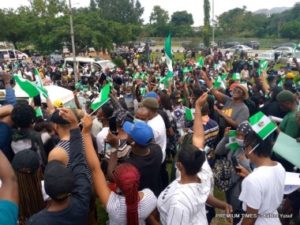A few weeks ago, when Nigerians, mostly the youth, gathered in parts of the nation, particularly Lagos, to protest against the brutality of the notorious police unit, Special Anti-Robbery Squad (SARS), not a few Nigerians thought the wind would soon blow over. However, this was not to be.

Weeks after the first sets of peaceful protests, the nation is reeling under widespread destruction, deaths, looting and vandalism by hoodlums, who eventually hijacked the protests, which has now spread to many cities, including the federal capital territory.
While the youth who initiated the protest to effect policy and institutional reforms have taken a backseat, hoodlums now hold sway in many cities, with security operatives battling to contain the situation, which many have argued may lead to total anarchy if not halted.
At the last count, over 60 persons have lost their lives in the protest, including 20 security operatives.
PREMIUM TIMES reported how a largely peaceful protest for change degenerated into large scale looting, deaths and vandalization.
This newspaper also reported how arsonists, looters and thieves have taken over large swathes of the nation, pillaging and destroying everything on their path while the security architecture, already weighed down by security challenges, seems to be buckling under this new weight.
The aftermath of these protests, especially the attendant violence, however, seems to have revealed aspects of the Nigerian situation, that we may have glossed over in recent years.
1. Alarming poverty level
Footages of Nigerians, cutting across ages, religions, ethnic groups, sex and political affiliations pillaging everything in sight including toilet seats, signposts, expired drugs, roofing sheets, and pieces of clothing will perhaps stay with us for a long time. It perhaps also re-emphasizes the unenviable status of Nigeria as the poverty capital of the world. The poverty level in the nation appears to have unearthed the animalistic tendencies in many, as the footages reveal.
2. Disenchantment and trust deficit
Many have argued that many of those who looted and destroyed private and government establishments were not pushed into the action by poverty but only wanted to show their rage against a warped system. There is also a large trust deficit in the relationship between the governed and the government. These could also be established by the hostile online chatter by many, who although may not have taken part in the street rampage, but nevertheless egged other ones on.
3. Social media: a two-edged sword
The power of social media was best reflected in the current crisis. While it served as a rallying point for the initial EndSARS protests, many with ill-motives also used it to spread mis/dis-information during the crisis, through Facebook, Whatsapp, Twitter and other platforms. These further inflamed nerves.
4. Over-stretched security
The nation’s security outfits which were already buckling under the weight of insecurity across the nation, including an unending insurgency in the North-east, buckled further under the current crisis. In the past few days, security personnel, including the military, have allowed hoodlums to ‘peacefully loot’ facilities while they watch in frustration.
5. Latent violence
Unprovoked attacks on private businesses, and government facilities and individuals show the violent streak in many Nigerians which seems to have been further exacerbated by the poverty level has peaked in recent years.